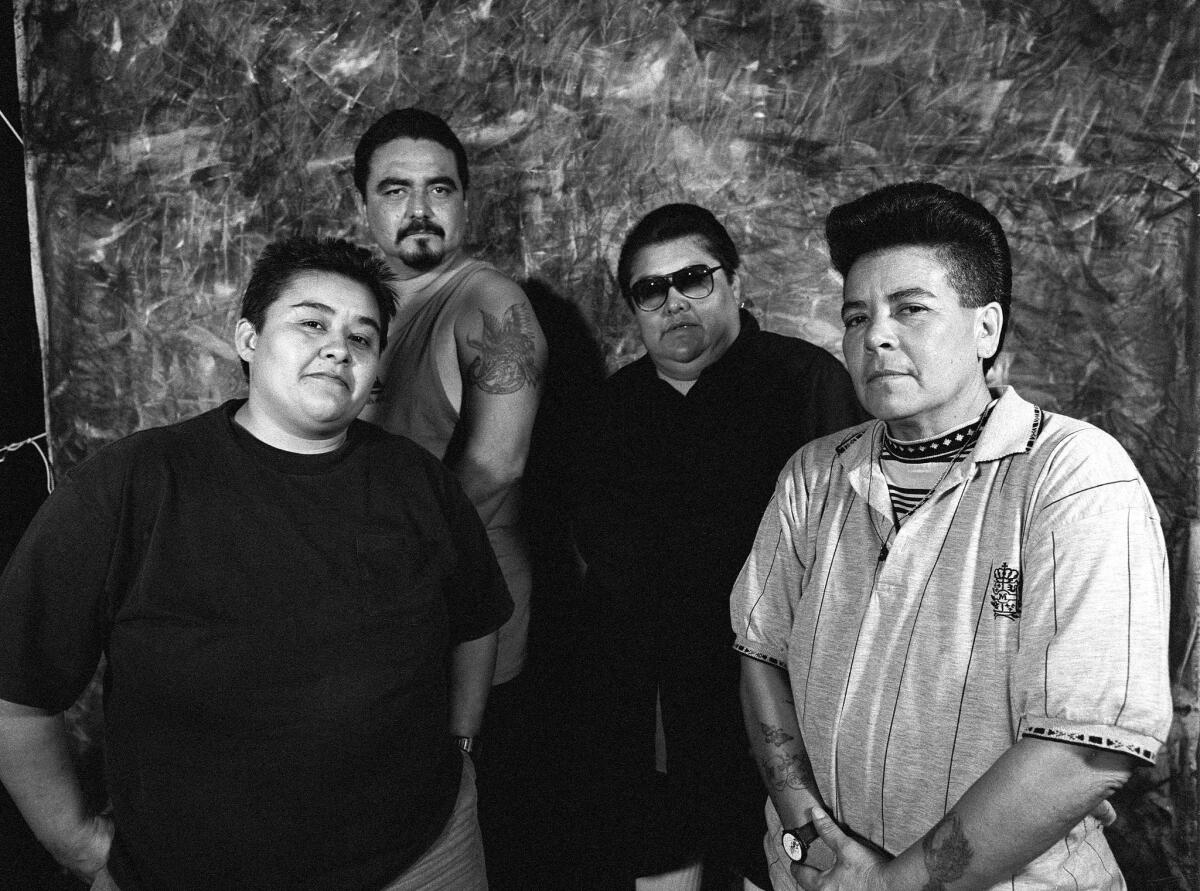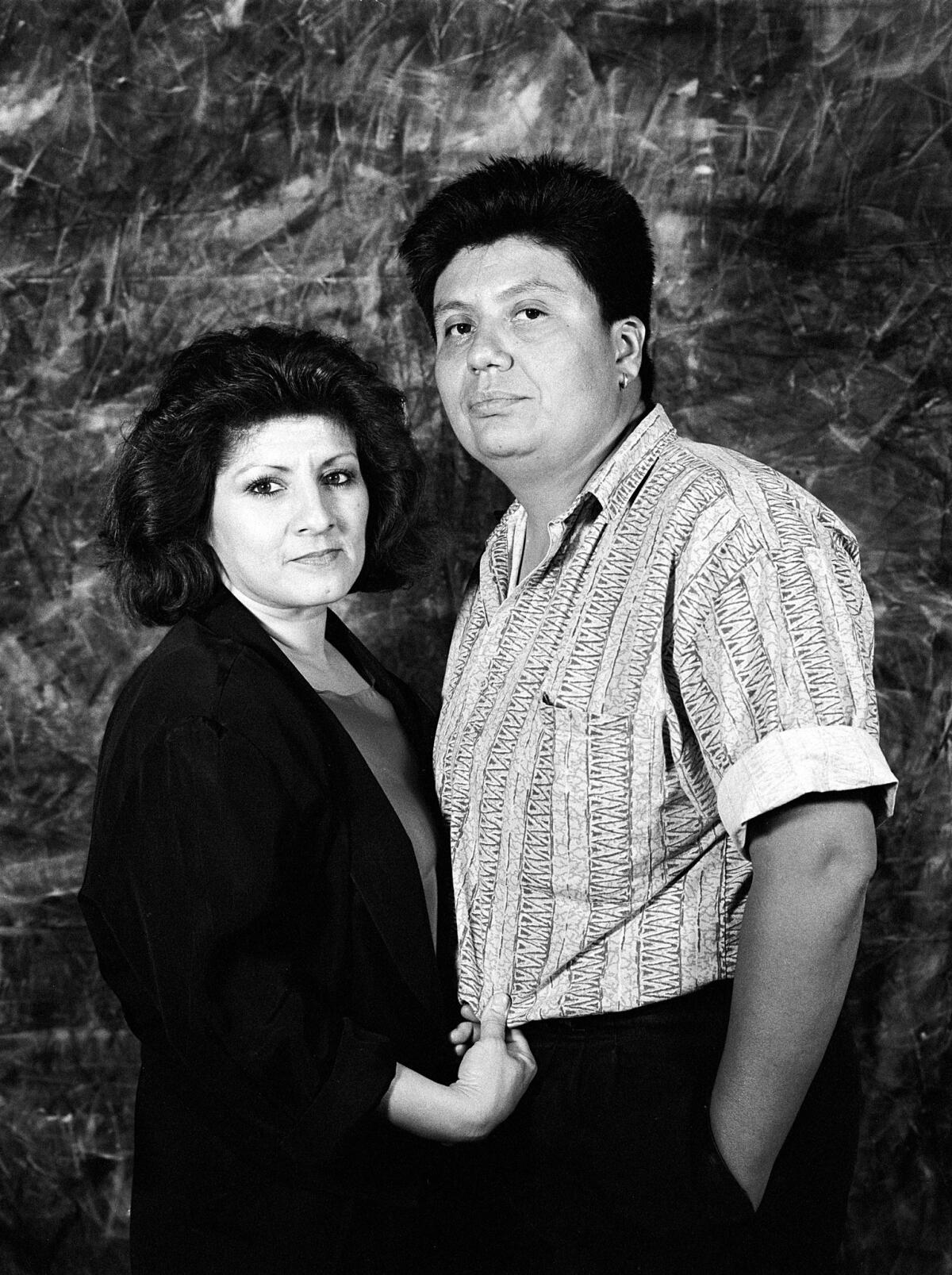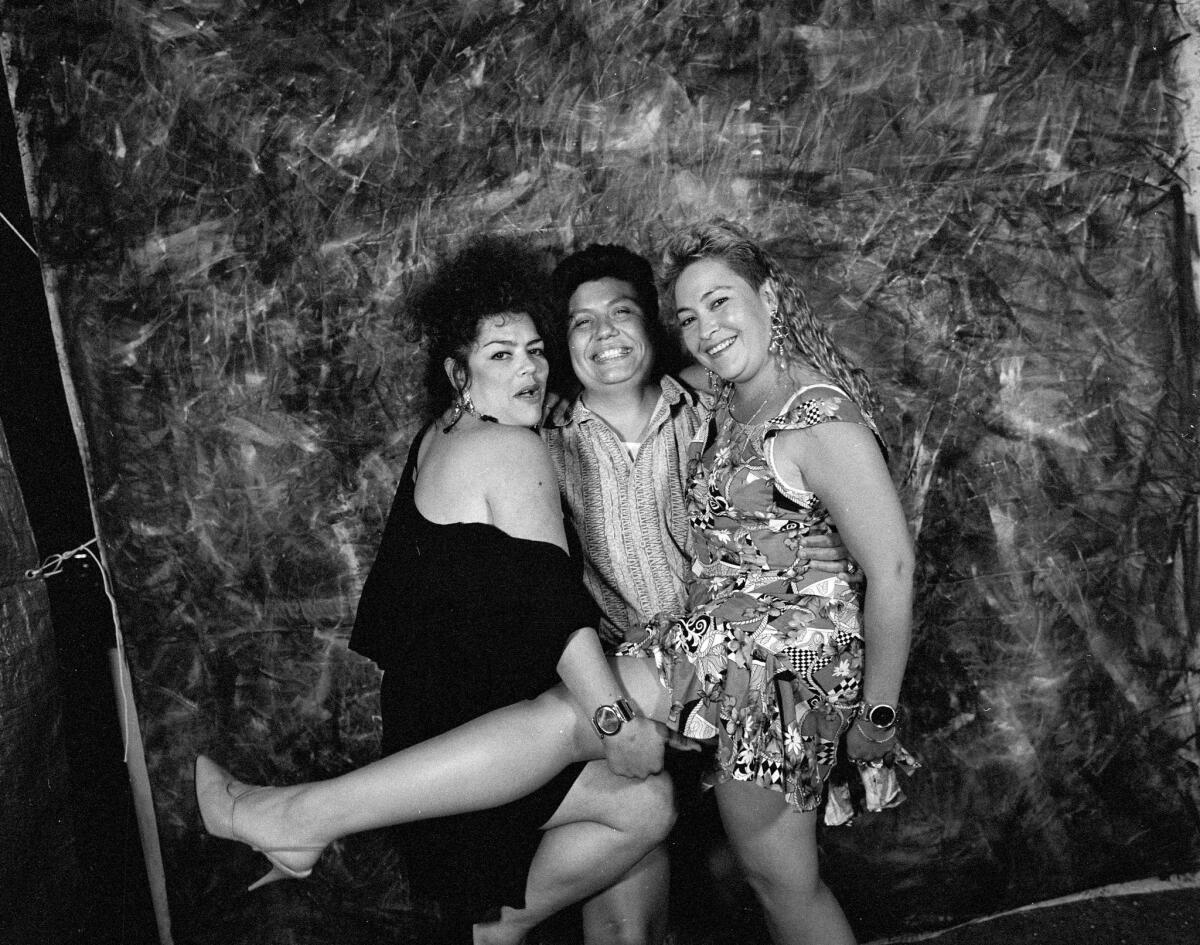Stories of the Plush Pony: Artist Laura Aguilar’s portraits capture a lost era at a working-class lesbian bar
In the early 1990s, a friend dragged artist Laura Aguilar to a small bar on an industrial stretch of Alhambra Avenue in El Sereno for a night on the town. “I’m a very shy person,” Aguilar explains. “I don’t hang out at bars.”
But once she arrived, she found herself inspired. The Plush Pony, housed in a squat, one-story building amid auto body shops and warehouses, was a lesbian bar that attracted Mexican and Chicana women with drink specials and Latin grooves.
“It was always festive,” Aguilar says. “It had all the beer stuff hanging for whatever holiday was coming.”
The scene was working class, and it was “very butch/femme,” the artist says. When she stepped into the place, she knew immediately that she had to take pictures.
Aguilar is a photographer who has recorded identity, gender and the organic forms of the body — often her own. At the time, she had been working on a series devoted to Latina lesbians — but the women she had worked with had been largely educated and professional: activists, artists and lawyers.
“This was the counterbalance,” she says. “I wanted to show the whole community, not just half a community.”

And so Aguilar got to work shooting portraits of the anonymous women (and one man) who regularly came through the doors of the Plush Pony, which shut down roughly a decade ago. Those images are now on view at the Vincent Price Art Museum at East Los Angeles College. They are part of the artist’s first comprehensive museum retrospective, “Laura Aguilar: Show and Tell,” which continues into next year as part of the Pacific Standard Time: LA/LA series of exhibitions.
Beyond the exhibition, the museum is paying special tribute to the Plush Pony on Saturday with a talk and event that will explore the importance of this under-the-radar social space.
“It’s a whole landscape that isn’t really visible,” says Pilar Tompkins Rivas, director of the Vincent Price museum. “Those kinds of spaces are really significant for a lot of intersecting communities.”
Saturday’s event, organized in collaboration with the media arts group LA Freewaves, will feature a discussion with various Los Angeles artists. And because this is a bar that is being honored, there will be a rollicking after-party.
“We’ll begin with a discussion led by Eve Oishi of Claremont Graduate University that will bring together a group of artists to talk about gender and the realm of what queer artists are doing,” Tompkins Rivas says. “Then we’ll move into our lobby to have a party.”
On the lineup are performance artist Nao Bustamante, painters Carolyn Castaño and Shizu Saldamando, artist and dancer Sebastián Hernandez and conceptualist Alex Donis, whose work explores the intersection of race, politics and LGBTQ issues. Guadalupe Rosales, whose archival project “Veteranas and Rucas” has been key to documenting Eastside party crews of the 1990s, will take part in the forum and host a DJ set.

The space that was the Plush Pony is now a notary and legal office. But Chela Plush, who ran the bar, is still active in organizing LGBTQ events for working-class Latinos across genders. (She could not be reached for comment.)
Even if the bar is gone, Aguilar’s photos remain, a vital record of a time and a place.
“The kind of work she was doing was ahead of its time in terms of representations of queer communities of color,” Tompkins Rivas says. “Today we have these conversations about identity and gender fluidity. And I think it was so significant that Laura was documenting this scene almost 25 years ago.”
Interestingly, Aguilar says the project didn’t get off to the best start. She offered to photograph the women for free and give them pictures in exchange for their time, but everyone reacted suspiciously.
“They were like, ‘Who is this person who wants to take our picture for free?’ ” she recalls. “So I said, ‘OK, five bucks.’ And then they said, ‘OK.’ And the first one signed the model’s release and then they all signed the model’s release, and I took their picture. And they never paid me!”
What about the lone man who appears in some of the images?
“Oh, he lived around the corner,” Aguilar says with a chuckle. “His wife, at least she knew where he was. He wasn’t going to be seeing anybody.”

+++
“Art as Gendered and Queer Space + Plush Pony After Hours”
Where: Vincent Price Art Museum, 1301 Cesar Chavez Ave., Monterey Park
When: Saturday — artist discussion from 3 to 5 p.m.; Plush Pony After Hours Party from 5 to 8 p.m.
Sign up for our weekly Essential Arts & Culture newsletter »
ALSO
Look what happens when you interview artist and Instagram sensation Guadalupe Rosales via text image
Femininity in Kevlar: Nao Bustamante's women of the Mexican Revolution
The biggest entertainment stories
Get our big stories about Hollywood, film, television, music, arts, culture and more right in your inbox as soon as they publish.
You may occasionally receive promotional content from the Los Angeles Times.








